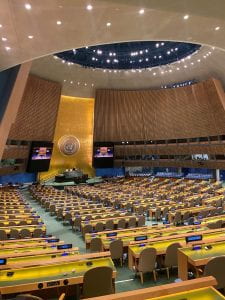 The following reflection is from Chadha Nacer ’24, a Pace University undergraduate who participated in the POL297L Global Politics of Disarmament and Arms Control class in Fall 2023. Students had the opportunity to engage in civic engagement assignments with disarmament advocacy efforts in the context of the UN General Assembly First Committee (Disarmament and International Security) meetings in New York City.
The following reflection is from Chadha Nacer ’24, a Pace University undergraduate who participated in the POL297L Global Politics of Disarmament and Arms Control class in Fall 2023. Students had the opportunity to engage in civic engagement assignments with disarmament advocacy efforts in the context of the UN General Assembly First Committee (Disarmament and International Security) meetings in New York City.
Like many young people, I have spent my time consuming carefully curated social media posts of my dream career; I was starry-eyed with the dreams of diplomatic work, and it was punctuated with a perfectly curated Pinterest vision board.
Each picture held a token of my association with diplomacy and work within the United Nations. One was a stack of books and messy, ink-smeared writing. Another was a woman speaking with deep conviction. Another was the timberland and gold General Assembly room that seemed to shine in its threaded opulence.
This sense of grandeur and prestige warmed me to the premise of the course Global Politics of Disarmament and Arms Control. Mandatory attendance at the United Nations meant I could use this course as an avenue to indulge in fantastical reality. I didn’t know what to expect, but I certainly wasn’t expecting the level of earnestness I encountered throughout the entire conference.
My encounters with political people to that point were steeped with the stereotypical dismissiveness and pretension that American politicians lead with. The speech is steeped with a scramble to secure their own interest. At the United Nations, however, I was surprised at the devotion to the cause as opposed to the narrative. Every interaction was grounded, and every conversation, no matter how trivial or grand, was concise and eager. The information presented to us was delivered at lightning speed and we were treated with a level of seriousness not often given to college students.
However, the language was the threshold where the grandeur began to fade away and the reality of where we were began to sink in. As we began to acquire an understanding of what was being said, I was exposed to a new kind of atrocity that I didn’t know existed in the world.
A significant part of my experience at the United Nations was centered around the Stop Killer Robots Coalition and their fight against autonomous weapons on the battlefield. Many people discuss the effects of artificial intelligence as it becomes more prevalent in our culture, but I don’t think any of them truly grasp the devastating impact it has in real-life situations.
Learning about cluster munitions systems and using my knowledge of ethics from previous courses to analyze the ethical dilemma posed by these autonomous weapons was incredibly engaging and has inspired me to take a new interest in the field of politics.
My experience at the United Nations deeply moved me because it shattered many of my preconceived notions about how substantial bureaucratic operations could be in marrying states to obligations. I had this lofty assumption that diplomats and leaders were untouchable figures, far removed from ordinary people like myself.
However, I discovered that many of them are on career paths that I aspire to, and they are not only attainable but also actively working to bring about change every day. Witnessing the system also allowed me to gain a better understanding of the function of the United Nations.
One common criticism is that the United Nations lacks true power because it cannot directly enforce punishment through executive action. However, I believe that the significance of soft power diplomacy is lost on many students, and I am grateful to have witnessed its effect and the respect it commands.
